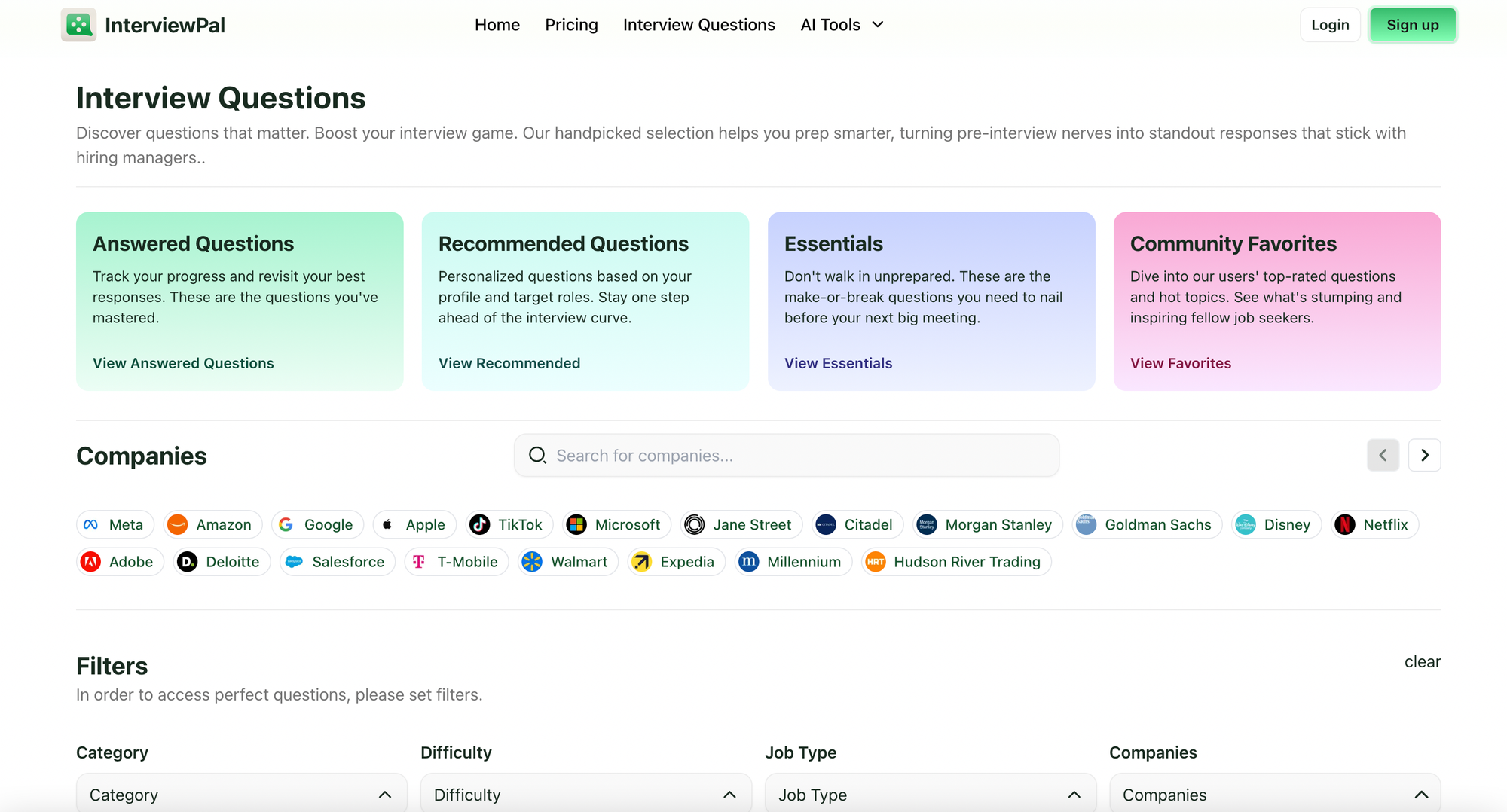One of the most telling questions interviewers often ask is: “How would you describe your working relationship with colleagues?” This seemingly simple question provides hiring managers with valuable insight into how you interact with others, how well you collaborate in a team environment, and whether your interpersonal style fits the company culture.
Answering this question thoughtfully requires a mix of honesty, self-awareness, and strategic positioning to showcase your strengths. In this post, we’ll walk through how to tackle this question, common mistakes to avoid, and how to use tools like InterviewPal to prepare your answer for maximum impact.
Why Do Employers Ask About Working Relationships?
When an interviewer asks you to describe your working relationship, they’re trying to understand more than just your technical skills. They want to gauge your:
- Collaboration Skills: Do you work well in teams? Can you communicate effectively with peers?
- Adaptability: How do you adjust to different personalities and work styles?
- Conflict Resolution: How do you handle disagreements or challenges with colleagues?
- Emotional Intelligence: Are you aware of how your behavior affects others, and can you manage interpersonal dynamics effectively?
This question is especially relevant in collaborative work environments, but it’s also useful for understanding how you’ll perform in more independent roles. A thoughtful answer can set you apart as a candidate who not only does their job well but also makes the workplace more harmonious and productive.
How to Structure Your Answer
Like any interview question, answering "Describe your working relationship" is best done with a strategy. Here’s a simple approach to structuring your response:
1. Reflect on Your Past Experiences
Think about your past jobs and the dynamics you’ve had with your colleagues. Were you a key team player? Did you frequently take the lead in projects? Were you known as someone who resolved conflicts or brought people together? Write down some examples to refresh your memory.
2. Highlight Positive Traits and Key Strengths
After reflecting on your experiences, identify specific traits that showcase your interpersonal skills. For example, were you approachable, easy to work with, or someone who fostered collaboration? Aim to emphasize qualities that are valued in the workplace, such as strong communication, reliability, and adaptability.
3. Use Concrete Examples
Backing up your traits with real-life examples helps demonstrate that you’re not just giving a rehearsed answer. You’re showing that you’ve practiced these qualities in the workplace. For instance, instead of just saying, “I work well with others,” you could say:
"In my last role, I worked closely with cross-functional teams to ensure that marketing and sales were aligned. I organized regular check-in meetings to foster communication and resolve any misalignment between departments. This effort resulted in a 15% increase in campaign success rates due to better coordination."
4. Be Honest About Challenges and How You Overcame Them
No one is perfect, and interviewers appreciate honesty. If there were times when a working relationship was difficult, it's okay to mention it—but focus on how you handled the situation constructively. Show that you can manage conflict or challenging personalities in a way that preserves harmony and productivity.For example:
"At one point, I worked with a colleague who had a very different communication style. Initially, it caused some misunderstandings, but I realized that by adjusting my approach—being more direct and setting clearer expectations—we were able to work more efficiently together."
Common Traits to Emphasize
If you’re struggling to figure out which aspects of your working relationship to highlight, consider these key traits that are often appreciated by employers:
1. Communication
Good communication is essential in any workplace. Whether it's keeping colleagues informed, giving feedback, or listening to others’ perspectives, being a strong communicator is always a valuable trait.
Example: "I make it a priority to ensure open and clear communication with my colleagues. I often act as the point person between teams, making sure everyone is on the same page and that any potential issues are addressed early."
2. Collaboration
Employers value candidates who can work collaboratively, both within their team and across departments.
Example: "In my last position, I collaborated with the product development team to ensure that customer feedback was integrated into our product updates. This collaboration allowed us to create features that were better aligned with user needs, improving customer satisfaction by 20%."
3. Reliability
Your colleagues need to know that they can count on you to deliver results, meet deadlines, and be dependable.
Example: "One of my strengths is that I’m very reliable. My team members knew they could count on me to get the job done on time and with attention to detail. This trust allowed us to complete multiple large projects smoothly without anyone needing to step in or follow up constantly."
4. Adaptability
Working with a diverse group of people means you’ll encounter different work styles and personalities. Employers want to know that you can adjust and work well in a variety of environments.
Example: "In a previous role, I worked with a remote team spread across different time zones. This required a lot of flexibility and adaptability, but by being organized and scheduling regular check-ins, we were able to collaborate effectively and meet all of our deadlines."
5. Conflict Resolution
Conflicts are inevitable, but how you handle them is what matters. Showing that you can navigate disagreements calmly and professionally is a big plus.
Example: "There was a time when two team members disagreed over the direction of a project. I facilitated a meeting where both sides could voice their concerns, and we worked together to find a solution that satisfied everyone. It helped us move forward and finish the project successfully."
Also read: How to Describe Your Working Relationship with Your Manager vs. Coworkers in Interviews
Avoiding Common Pitfalls
When answering this question, there are a few things you should avoid to ensure that your response is well-received:
- Avoid Focusing Only on Negative Experiences: While it's okay to mention challenges, don't dwell on them or make your answer sound like a complaint. Focus on how you overcame the challenges and what you learned.
- Don’t Overemphasize Solo Work: Even if you’re applying for a more independent role, emphasize that you can collaborate effectively when needed. Companies still value teamwork even for roles that require self-direction.
- Avoid Generalizations: Saying something vague like "I get along with everyone" doesn’t offer any meaningful insight. Be specific in how you work with others and give examples to back it up.
Sample Answers for “Describe Your Working Relationship”

For a Team-Oriented Role:
"I’ve always valued teamwork and collaboration in my previous roles. I make it a point to foster open communication, and I believe that every team member has something valuable to contribute. In my last job, I led weekly check-ins where everyone could share updates and roadblocks. This helped the team stay aligned and allowed us to support each other, which improved overall efficiency."
For an Independent Role:
"While I’m very comfortable working independently and managing my own tasks, I also understand the importance of collaboration when needed. In my current role, I often work on solo projects, but I make sure to keep the team updated and offer support when needed. For example, during a recent project, I helped a colleague troubleshoot an issue, which saved them time and helped the team meet our deadline."
For a Leadership Role:
"In my leadership roles, I’ve focused on creating an environment where everyone feels heard and valued. I believe in setting clear expectations and providing support, but also giving my team the autonomy to own their projects. I encourage regular feedback sessions to ensure that communication flows in both directions. This approach has helped foster strong working relationships and contributed to the success of our projects."
How Personality and Work Style Assessments Can Help
If you're unsure how to describe your working relationship, personality and work style assessments can provide valuable insights. Tools like the Myers-Briggs Type Indicator (MBTI) or the DiSC profile can help you understand how you interact with others and what your natural strengths are in a team environment.For example, if the MBTI reveals that you’re an ENFJ (Extraverted, Intuitive, Feeling, Judging), you might emphasize your ability to build relationships and lead teams. Meanwhile, a DiSC assessment that highlights you as a "Steadiness" type might indicate that you're dependable and a great listener—both valuable traits in collaborative work settings.
How InterviewPal Can Help You Master This Question
At InterviewPal, we understand that preparing for interview questions like “Describe your working relationship” can feel daunting. That’s why our platform is designed to help you:
- Practice your responses: Use our mock interview feature to rehearse your answer and get real-time feedback.
- Get personalized insights: Our AI-driven system will offer tailored advice based on your responses, helping you fine-tune your delivery.
- Build confidence: The more you practice, the more confident you’ll feel walking into your next interview, ready to give thoughtful and impressive answers.
Whether you're prepping for a collaborative role or an independent one, InterviewPal can help you showcase your strengths and stand out as the ideal candidate.
How to Describe Your Working Relationship in an Interview
Describing your working relationship in an interview is about more than just stating that you work well with others—it’s an opportunity to showcase your communication skills, adaptability, and emotional intelligence. By using specific examples and reflecting on your past experiences, you can craft a strong response that highlights how you bring value to a team. And with InterviewPal’s tools and practice sessions, you’ll be fully prepared to answer this question with confidence and clarity.



